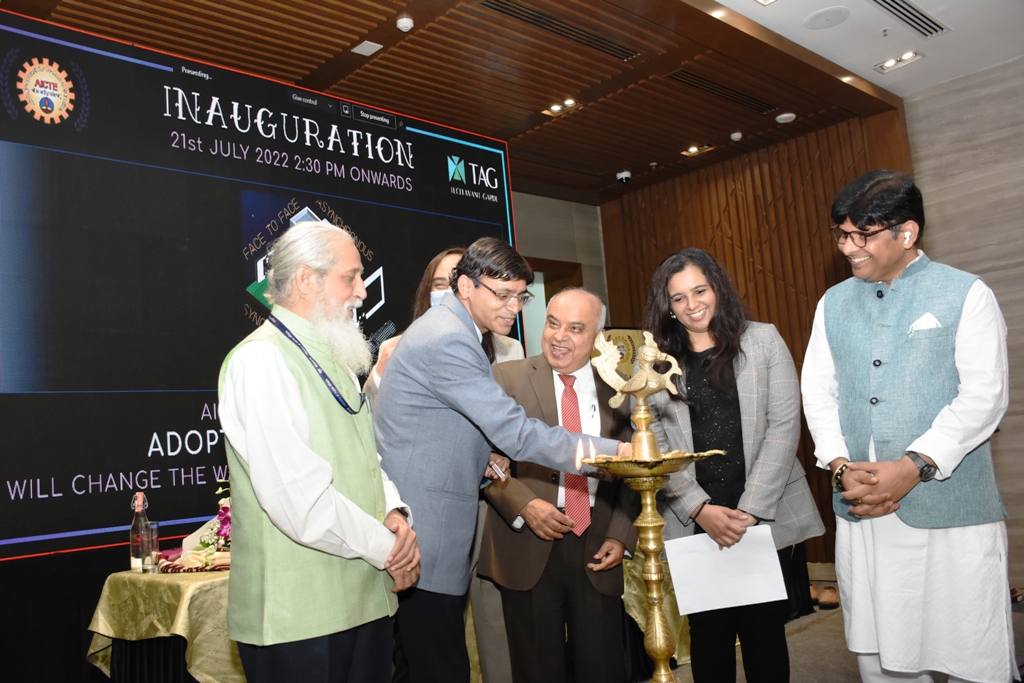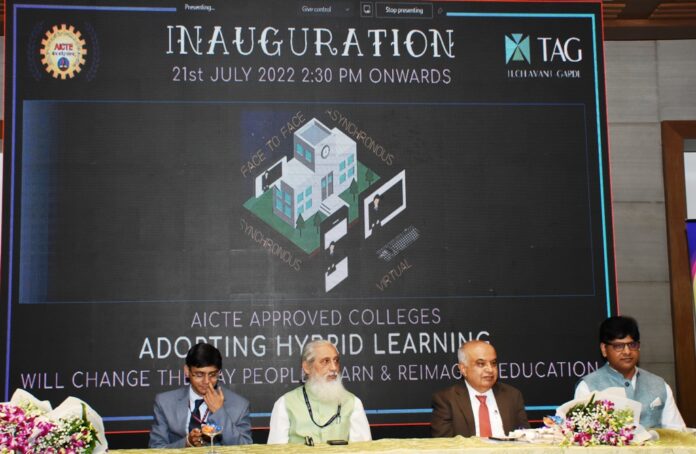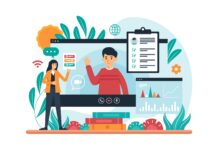Bangalore, 21 July 2022: Prof. Anil Dattatraya Sahasrabudhe, Chairman, AICTE as Chief Guest inaugurated the Hybrid Learning Curtain Raiser mega event held on 21 July 2022 at the WelcomHotel by ITC Hotels. He was accompanied by the Guests of Honour Dr. Buddha Chandrashekhar, Chief Coordinating Officer and Prof. B. Thimme Gowda, Vice Chairman, Karnataka State Higher Education Council.
AICTE has advised all its approved colleges to adopt Hybrid Learning to make them robust and lockdown proof. Tech Avant-Garde (TAG) has been chosen to assist these colleges to transform into Hybrid Learning Spaces. Ali Sait, CEO, TAG, was also present.
As the first step towards Digital Transformation, TAG is conducting free certification program to train heads of Institutions in Hybrid Learning. Tech Avant-Garde, the Global Partner of Microsoft, in association with Microsoft Education is conducting this training program for Education Leaders on new paradigms of learning – Hybrid Learning.
Speaking at the event, Ali Sait, CEO of Tech Avant-Garde, said, “In Hybrid Learning, education will be reimagined, teachers will find their potential, learning will be from anywhere, any place on any device and there will be only one degree of separation between Learning and Education”.

Hybrid Learning Training Program
This program will commence from 29 July 2022. Training will be conducted in three batches. The sessions will be conducted online over a period two days. The duration of training for each day will be for one hour and thirty minutes. The participants can select the batches during registration.
The training dates are as follows:
- Batch 1: Friday 29th July 2022 – Saturday 20th July 2022
- Batch 2: Friday 05 Aug 2022 – Saturday 06th Aug 2022
- Batch 3: Friday 12th Aug 2022 – Saturday 13th Aug 2022
The registration link for the training program is – https://tagevent.in/aicte
Training Agenda:
This training program will cover the following topics:
- Develop your vision and build a roadmap to get there
- Prepare your Stakeholders
- Develop model Colleges
- Stay connected
- Real time case studies
The Education Leaders who attend this program will get certified and the colleges will become eligible for two sessions of advisory on Hybrid Learning, to be availed within 2 months of the program.
The program will be conducted on Knowledege L’avenir platform.
About Tech Avant-Garde:
Tech Avant-Garde (TAG) is India’s largest Solution Provider in the education segment, supporting all genre of institutes, ranging from K-12 schools to universities. TAG is a part of the Accelerator program of Microsoft and has been certified as a Global Trainer for Microsoft in Education. TAG won the award for the Best Worldwide Training Partner of Microsoft Asia region. TAG, as a co-sell partner and ISV of Microsoft, has implemented the Digital Transformation and Holistic Learning program to help educational institutions to navigate from physical classrooms to digital classrooms. Some of the products and solutions of Tech Avant-Garde include Lycee-Cyber Academe, an ERP Campus Management solution, Efeeonline, an Online Multimode Fee payment solution for educational institutions which is connected to the Bharat Bill Payment System developed by NPCI. TAG also works in knowledge enhancement of educators through Knowledge L’avenir, the largest social learning platform for teacher and Knowledge Key Foundation, to bring state-of-the-art technology and tools to aid institutions and teachers to enhance their digital teaching and learning skills.
Also Read: MIT – World Peace University Records Highest CTC at *Rs 44.14 Lakhs
Hybrid Learning framework – Education Reimagined
The Hybrid Model combines the best of in-class and remote learning, with digital engagement. It is more than a quick fix. It is a way to enhance and accelerate learning by providing student centered approaches to meet diverse learners’ needs.
Teachers and leaders who adopted Digital Learning have reported some important learnings. What they discovered was so powerful that they did not want to slip back to the status quo.
Their learning was as follows: Acknowledgement that well-being was a critical pre-condition for learning. Technology shifted from being a vehicle for delivery/ transmission to a mechanism for collaboration, social connectedness and culture building. Self-regulation and Learning to Learn were key determinants of student motivation, engagement, and success. Students who found themselves with more choice and voice, exceeded expectations finding ways to help themselves and collaborate with others. Collaboration among teachers and leaders emerged as the focus was clear. In the absence of high stakes testing, systems relied on teachers’ and leaders’ professional judgements.
Even before the pandemic, there was readiness building for a new system of learning. The current system had stalled, and the pandemic vividly exposed our systemic inability to optimize the use of technology and truly ensure equity, well-being and quality of learning. Education reform has been high on the agenda for many systems but has focused narrowly on literacy, numeracy, and graduation without addressing the holistic needs of students in an increasingly unpredictable global society.
Quality learning must be built on the interests of students along the following dimensions: Connecting to purpose and meaning; challenging students to have high expectations; positioning learning goals that focus beyond the basics; using engaging pedagogies; building relationships and belongingness; providing opportunities to contribute to the world.
We see glimpses of this potentially powerful reform after the introduction of NEP 2020 across institutions in our network. The new Pedagogies such as Gen Extra Muros have enhanced Hybrid Learning. This combination of readiness for change and urgency arising from the current crisis has the potential to shift the education system from one of outdated “schooling” to future focused ‘learning” and take learning out of the classroom and into the world.
Digital Transformation and its impact on Education
Digital transformation is an indisputable force revolutionizing our industries, reinventing our products, redefining our services and reshaping the way we live and work. Its impact demands a change in Education Institutions and teaching practices. It shows how emerging technologies, including Analytics and Artificial Intelligence, deliver far greater understanding of student capabilities and support new approaches to teaching and learning.
Educational Institutions around the world quickly transformed into online Centres of Learning when the pandemic hit but as students and teachers are returning to the physical space, it is the time to see this as an exciting opportunity to fundamentally change the lives of students and shift the trajectory of our community to re-think the education system.
Today’s students need real-world skills to thrive in the not-too-distant future. They must develop qualities like critical thinking, collaboration, creativity, self-awareness, self-management, responsible decision-making and the ability to construct complex solutions. This is true regardless of subject area. Complex skills are as important for artistic, service, and human-oriented professions as they are for more scientific, technological or industrial employment.
Professional development for Education leaders
Highest success of adoption among the teachers begins with the leadership team as they adopt a growth mindset, exhibit a personal culture of learning and leverage modern technologies to support their collaboration and communication. They must reach beyond their institution’s walls to work with other educational systems, educational Institutions and communities and consider the successes of others to develop their own methodologies. In the process, they practice a principle of distributed leadership, where they share responsibilities across their organization and empower others. A learning leader focuses on empowering teachers in their craft so that they can educate their students better. They use data to assess how their students and teachers are performing and create a congenial environment where teachers can learn from one another.
With implementation of technology and using the Hybrid Learning Pedagogy, educational institutions can take advantage of Cognitive Learning, Mixed Reality, Immersive Learning, IOT, AR-VR, STEM & STEAM Learning and Artificial Intelligence, which will eventually reach students at home. This will eventually result in learning without Limits.
Visit EasyShiksha for skill development.




































































